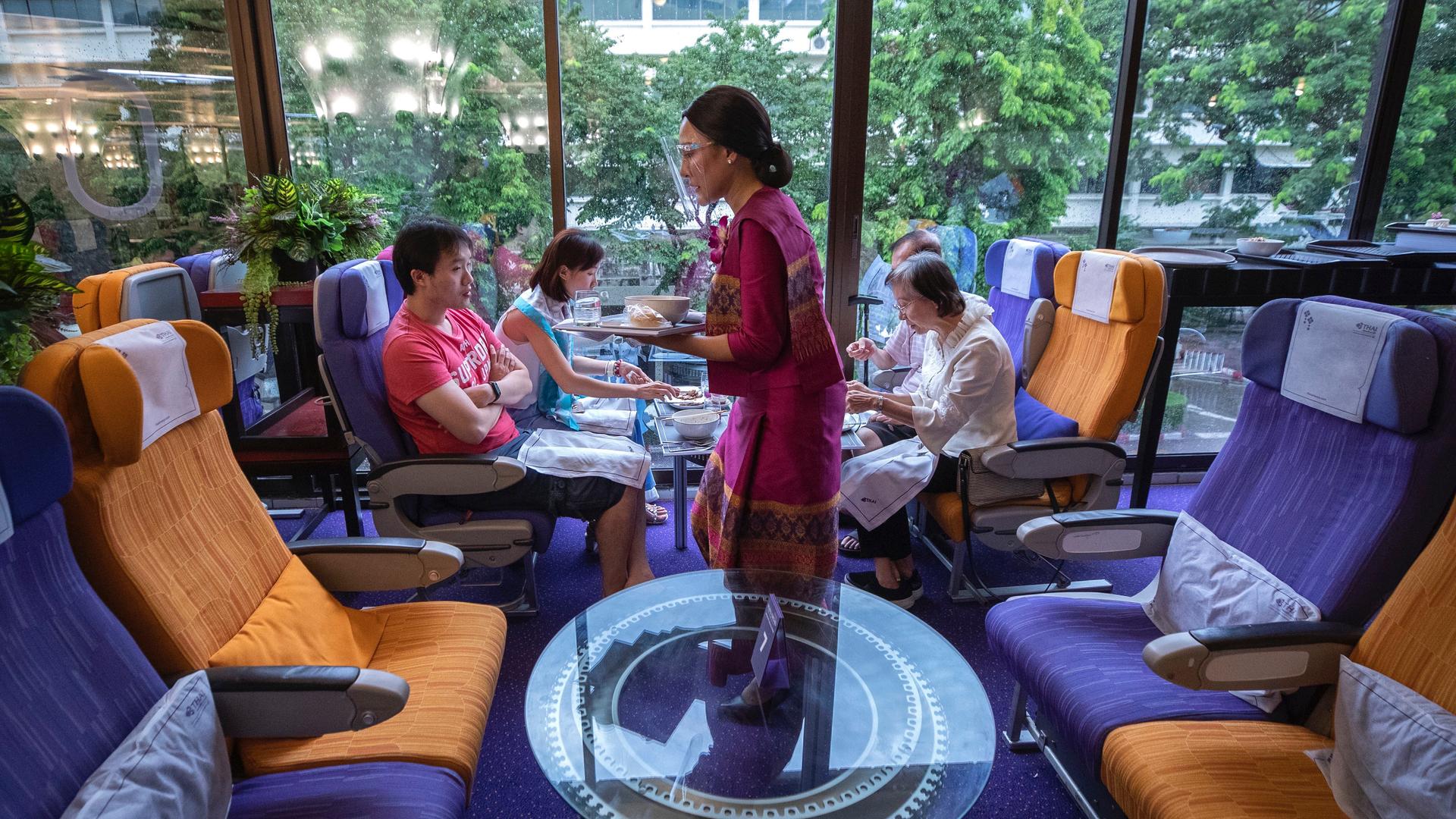First-class swag, airplane meals, ‘flights to nowhere’: Airlines innovate amid pandemic
When Chris Rider flies to Vancouver, British Columbia, Canada, from his home in Whitehorse, Yukon, he always chooses the locally owned airline, Air North. One big reason is the food.
The meals are prepared in Whitehorse, and in his view, they’re “one of the best things about Air North.” A standout is the bison shepherd’s pie.
“That’s not normal airline food no matter where you fly,” said Rider, executive director of the Canadian Parks and Wilderness Society Yukon.
Related: Airline industry’s health could determine success rate for organ donors
But because of the pandemic, Rider hasn’t stepped onto a plane since the end of February. So, when he heard that Air North was offering frozen, in-flight meals for home delivery, he snapped up 20 of them.
“They came, they deliver it, put it down on a little table. And it’s almost like that white tablecloth service, where they put it down and then they step back and allow you to pick up the food. But the best part was that they also left a couple of cookies.”
“They came, they deliver it, put it down on a little table,” he said. “And it’s almost like that white tablecloth service, where they put it down and then they step back and allow you to pick up the food. But the best part was that they also left a couple of cookies.”
The home delivery service is one way that Air North, like other airlines, has adapted its business to try to stay afloat during the pandemic.
For a $10 delivery fee, customers in Whitehorse can purchase prepackaged meals that feed two people for $7-$9 a meal. The meals always include the airline’s beloved chocolate chip cookies, which are served warm during a flight.
Related: China’s ‘Operation Empty Plate’ targets food waste
Other airlines around the world have been even more ambitious. Canada’s biggest airline, Air Canada, is trying to lure customers back by offering a fixed-price ticket for unlimited travel over a period of a month to three months. Qantas, in Australia, has sold items it normally gives only to first-class passengers — like 10,000 sets of Qantas pajamas. It also sold fully stocked bar carts from its recently retired fleet of 747s.
Last month, the airline offered tickets for a special, nonstop, physically distanced flight to nowhere. The seven-hour journey will take passengers on a loop of the continent, taking off and landing in Sydney and promising low-level flybys of the Great Barrier Reef, Byron Bay and the Sydney Harbor. Frequent flyers jumped at the chance. Qantas said the flight sold out in 10 minutes.
Kevin Bryan, an economist at the University of Toronto’s Rotman School of Management, says airline companies have always been good at innovating. That’s one reason they’ve survived tough spells before. But, he says this time is different.
“The restrictions on what airlines are allowed to do or what they’ll want to do given that customers won’t fly if they have to quarantine when they land, especially for two weeks, makes it very challenging, not just in the US but worldwide.”
“The restrictions on what airlines are allowed to do or what they’ll want to do given that customers won’t fly if they have to quarantine when they land, especially for two weeks, makes it very challenging, not just in the US but worldwide,” he said.
Related: This Ghanaian company is producing fabric with motifs inspired by COVID-19
Bryan says none of the initiatives will make much money for the airlines. But since they already own their planes, they have little to lose.
“If you had to rent out a whole new plane in order to fly in a circle on a flight to nowhere, no one would do it. But if you’ve got the plane sitting on the runway, anyway, that’s essentially just all profit, anyone you can put in a seat. So, you might as well do what you can,” he said.
Bryan said some of the initiatives are also aimed at building brand recognition and retaining customer loyalty while planes are grounded.
Support for the local economy
Joe Sparling, president of Air North, said his company’s food delivery program is also aimed at supporting the local economy. He said the airline sources ingredients locally and everything is made in Whitehorse. Air North employs about 400 people, including catering staff, in a province with only 10,000 residents. So, it has kept many of its people working through the home delivery service.
But Air North hasn’t avoided layoffs altogether. It’s operating with just over half of its regular staff.
“The Yukon is a bit of a microcosm of Canada as a whole. And to get through this pandemic with as minimum impact [as possible] on the territory, we have to encourage people to look after one another by supporting local businesses. It’s not just about the airline, it’s about local businesses, in general.”
“The Yukon is a bit of a microcosm of Canada as a whole. And to get through this pandemic with as minimum impact [as possible] on the territory, we have to encourage people to look after one another by supporting local businesses,” Sparling said. “It’s not just about the airline, it’s about local businesses, in general.”
Related: Poets and novelists have basically been writing about life under COVID-19 for more than a century
Rider said that’s the kind of initiative that keeps him loyal to Air North.
“I value them as part of our community and wanted to help support them. I know it wasn’t a big contribution, but it was the small thing I could do to help keep them running,” he said.
The bigger Canadian airlines are also in deep trouble. They’ve laid off more than 30,000 workers, and airline workers’ unions say more job losses are coming unless they get help from the Canadian government.
